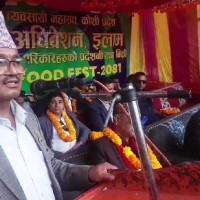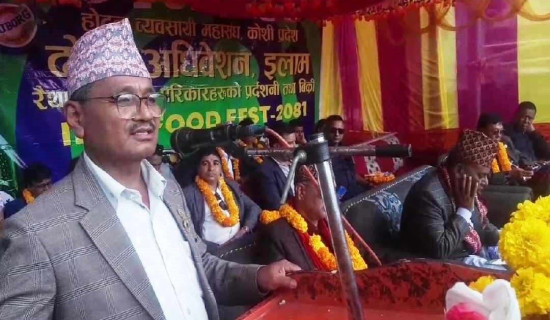- Sunday, 24 November 2024
Singh conducts solo campaign to conserve endangered vultures
By Lalit Basel,Surkhet, Nov. 24: While the Karnali Province government is only now drafting plans for vulture conservation, Govinda Bahadur Singh of Barekot Rural Municipality-5, Jajarkot, has been leading a solo campaign for nearly a decade, funding the effort with his personal resources.
Since April 2013, Singh has been actively engaged in protecting vultures, conducting research and treating injured wildlife across various districts in Karnali.
Singh has identified nesting sites for endangered vultures and has recovered traps, catapults and other illegal hunting tools. Over the years, he has submitted over 700 catapults, 290 metal traps, 35 deer snares and 800 bird traps to the authorities.
In addition to rescuing 120 vultures, he has treated 168 wild animals, including 18 vultures. A veterinary technician by profession, Singh dedicates half his salary to conserving vultures and wildlife, citing the lack of interest and awareness about this issue. Expressing frustration, he shared how government budget for conservation has often been frozen due to negligence.
Research on vultures in Karnali
Singh's efforts have identified 212 vultures and 63 nests across Karnali. Jajarkot has the largest population, with 82 vultures, followed by Dolpa (26), Rukum (17), Salyan (14), Kalikot (12), Humla (27) and Jumla (34). Among the nine vulture species found in Nepal, five are present in Karnali. They include Himalayan Vulture, Golden Vulture, White-rumped Vulture, Slender-billed Vulture, and Red-headed Vulture and these are all classified as rare species.
Singh has also documented other endangered birds, including Cheer Pheasants, Blood Pheasants, Danphe (Himalayan Monal), and Munal in Dolpa, Humla, Jumla, Jajarkot, and Rukum West.
Singh has rescued and treated various wild animals, including 18 Himalayan vultures, 120 birds, six snakes, six owls and 18 other animals, all at his own expense. He has also worked to remove traps from forests and hand them over to authorities, though he lamented a lack of encouragement from officials.
Government commitment to conservation
The Karnali Province government has a commitment to support Singh’s work, announcing plans to include conservation initiatives for endangered vultures in the current fiscal year.
The Ministry of Industry, Tourism, Forests and Environment has committed to conduct research and develop programmes for vulture preservation across the province. Minister Suresh Adhikari affirmed that the government would collaborate with conservationists like Singh to create sustainable programmes and continue vulture conservation efforts in the coming years.
The Bird Conservation Nepal (BCN), which works on vulture conservation at the national level, has called for efforts to protect vulture nests in Karnali. Bhupal Nepali, a project officer at the association, stressed the importance of conserving vulture nests to maintain ecological balance, saying that of the 23 vulture species worldwide, nine are found in Nepal.
While vultures are present across most districts of Karnali, Jajarkot stands out for hosting a higher number of endangered species. Nepali highlighted that the ban on the veterinary drug diclofenac sodium has contributed to a gradual increase in vulture populations. He urged local and provincial governments to introduce more conservation programmes to sustain this growth.
















